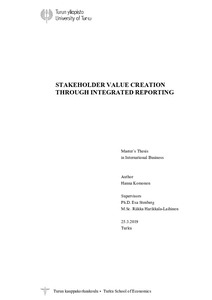Stakeholder value creation through integrated reporting
Komonen, Hanna (2019-04-24)
Stakeholder value creation through integrated reporting
Komonen, Hanna
(24.04.2019)
Julkaisu on tekijänoikeussäännösten alainen. Teosta voi lukea ja tulostaa henkilökohtaista käyttöä varten. Käyttö kaupallisiin tarkoituksiin on kielletty.
avoin
Julkaisun pysyvä osoite on:
https://urn.fi/URN:NBN:fi-fe2019043013821
https://urn.fi/URN:NBN:fi-fe2019043013821
Tiivistelmä
Corporate reporting has evolved from stand-alone financial reports and standalone nonfinancial reports to reports that integrate both financial and nonfinancial information. Various frameworks and standards are used to help the reporting process. The Integrated Reporting framework is one of these frameworks. It defines an integrated report as “a concise communication about how an organisation’s strategy, governance, performance and prospects, in the context of its external environment, lead to the creation of value over the short, medium and long term”. Integrated reporting has a multiple stakeholder approach. More and more companies globally are starting to adopt integrated reporting.
This study analysed the means companies create value for stakeholders through integrated reporting. Integrated reporting is comparatively new theme for research. It was identified that the context of integrated reporting in the sustainability reporting field should be studied more. In addition, the value creation process and stakeholder engagement in integrated reporting were identified as research focuses of this study. A theoretical framework for analysing stakeholder value creation through integrated reporting was created after the literature review and it was the base for the empirical part of the study. The framework had three themes defining stakeholder value creation through integrated reporting: understanding integrated reporting in the (sustainability) reporting context; identifying stakeholders and practicing quality stakeholder engagement; and creating shared value through dialogue.
The research approach of this study was qualitative. The data for this study was collected in two ways: interviews and secondary data. All the studied companies were quality integrated reporters based in Europe. The company interviews were analysed with thematic analysis and the secondary data, the latest integrated reports from the companies, was analysed with content analysis. The analysed companies had a clear view of what integrated reporting really is. The holistic value creation focus of integrated reporting was seen as a main characteristic for integrated reporting. The link between strategy, competitive advantage and integrated reporting was also found significant. Stakeholder dialogue was seen important in integrated reporting. This active relationship with the stakeholders was seen as the key to successful business. Integrated reports are one-way dialogue, but the process of integrated reporting and the engagement and dialogue it requires bring the communication to a two-way level. Three main groups were identified that can find this study especially valuable: companies practicing integrated reporting, companies considering moving to integrated reporting, and the stakeholders of companies practicing integrated reporting.
This study analysed the means companies create value for stakeholders through integrated reporting. Integrated reporting is comparatively new theme for research. It was identified that the context of integrated reporting in the sustainability reporting field should be studied more. In addition, the value creation process and stakeholder engagement in integrated reporting were identified as research focuses of this study. A theoretical framework for analysing stakeholder value creation through integrated reporting was created after the literature review and it was the base for the empirical part of the study. The framework had three themes defining stakeholder value creation through integrated reporting: understanding integrated reporting in the (sustainability) reporting context; identifying stakeholders and practicing quality stakeholder engagement; and creating shared value through dialogue.
The research approach of this study was qualitative. The data for this study was collected in two ways: interviews and secondary data. All the studied companies were quality integrated reporters based in Europe. The company interviews were analysed with thematic analysis and the secondary data, the latest integrated reports from the companies, was analysed with content analysis. The analysed companies had a clear view of what integrated reporting really is. The holistic value creation focus of integrated reporting was seen as a main characteristic for integrated reporting. The link between strategy, competitive advantage and integrated reporting was also found significant. Stakeholder dialogue was seen important in integrated reporting. This active relationship with the stakeholders was seen as the key to successful business. Integrated reports are one-way dialogue, but the process of integrated reporting and the engagement and dialogue it requires bring the communication to a two-way level. Three main groups were identified that can find this study especially valuable: companies practicing integrated reporting, companies considering moving to integrated reporting, and the stakeholders of companies practicing integrated reporting.
